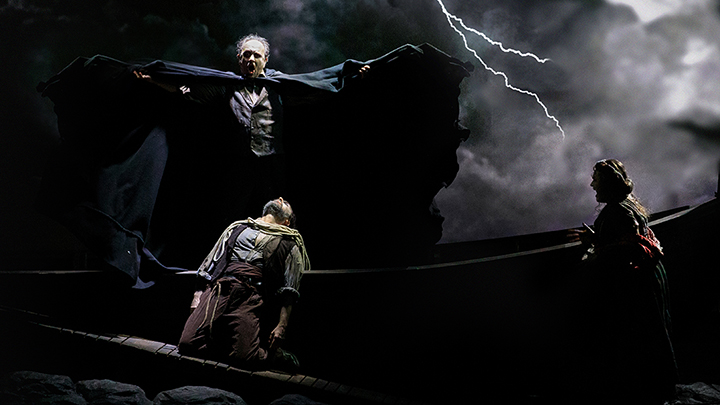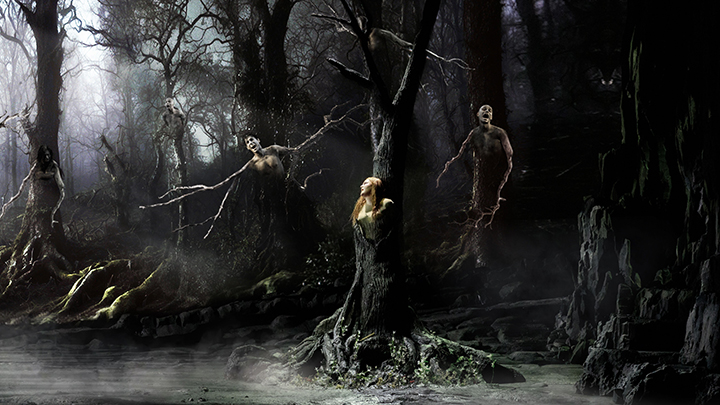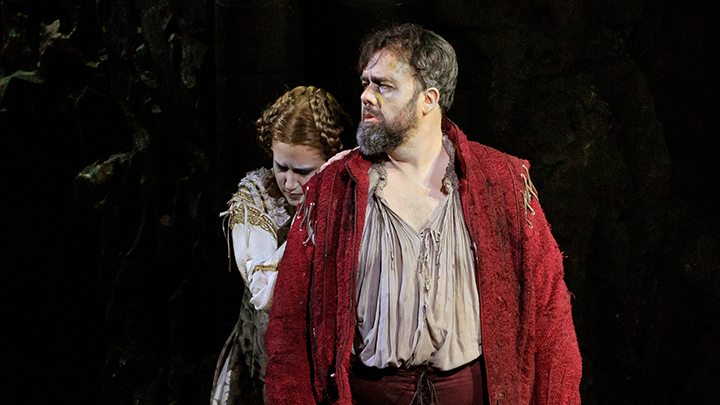If you happen to’re going by way of hell

The ignavi – those that refuse to take sides in debates – for instance, are condemned to march endlessly behind a white flag. The lustful (the place we meet Paolo and Francesca, from that different large early 20th century Dante opera), knocked round in an infinite windstorm simply as their passions carried them away in life (which might additionally explains the random New Rochelle dustbowl scene in Luca Guadagnino’s wretched Challengers). So, sitting at Bologna’s Comunale Nouveau (the provisional theater within the metropolis’s conference heart space whereas the primary theater, attributable to reopen in 2026, undergoes repairs) on Friday for Pier Francesco Maestrini’s Dantesque, agenda-driven Il trittico, I used to be questioning what I may need executed to have to help to such a bland, wayward manufacturing – or what punishment I would finally incur for writing about it!
Like some students, Maestrini sees Trittico’s three elements as equating to Dante’s three canticles – the ceaseless infernal torment of Tabarro, Angelica’s Purgatory of perpetual anticipation in Suor Angelica, and Gianni Schicchi’s hard-earned snort as Paradise (even supposing Gianni Schicchi, the one character of Dante’s devising in Trittico, is gnawing on necks in Inferno Canto XXX). He accordingly pumps the three operas stuffed with visible references to each the Divina Commedia and Gustave Doré’s well-known illustrations of it, with out a lot coherence, usually saying little concerning the operas’ distinct dramaturgies.
Tabarro makes it out the least scathed of the three; although construing the barge captain Michele as a Charon determine, schlepping useless souls throughout the river Styx, doesn’t make a lot sense, and the video dietary supplements of the hellish hauling stevedores regarded like Lord of the Rings (a cultural property with which Italy has a very particular relationship), Maestrini at the very least grasps the opera’s abundance of floor distress. How Luigi is ready to die in hell, nevertheless, stays past my understanding.

However Suor Angelica, unfolding on ostensibly the seaside of Purgatorio I, was a lot, a lot lumpier. Whereas the opera’s lopsided doctrine of expiation lends itself to a Purgatory-inspired take, on the finish, Angelica, who takes poison after studying concerning the loss of life of her son, is ratcheted again to Inferno XIII the place the souls of those that die by suicide are became bushes. The scene was much less harking back to Dante, whose bushes are usually not anthropomorphic, however a mixture of Otto Schenck’s Rusalka and the forest from The Wizard of Oz. As Angelica raised her limp arms in direction of some generic supply of sunshine and died, I think about dry eyes abounded.
Schicchi, whose comedy is ceaseless however unsubtle, got here off the least effectually. Librettist Giovacchino Forzano flexed some finely tuned Tuscan literary chops in coaxing stomach laughs out of the disquieting Inferno scene a couple of falsified will, however Maestrini is extra excited about sight gags like Buoso’s grasping kinfolk plod round in gilded, leaden robes à la Inferno XXII, the cheerful, Monty Python-esque friars, and the starlings swarming round Rinuccio and Lauretta (as soon as once more, an Inferno V callback). The manufacturing’s ultimate picture is of a playful demon farting.
However relatively than an arc, a development in direction of one thing, the staging was as a substitute only a circuitous seize bag tied collectively by the exaggerated and grim units, costumes, and lighting of Nicolas Boni, Stefania Scaraggi, and Daniele Naldi, respectively, and the advanced video backdrops that set the scenes. A buddy of mine likes to quote how a Dante scholar as soon as informed her that to turn out to be an skilled within the sommo poeta, it requires “20 years sitting in your ass” – this manufacturing, whereas not yielding any comparable mental fruit, affords a comparable bodily sensation.

The singers nonetheless managed to interrupt by way of and make particular person impressions; Franco Vassallo was a excessive tragedy Michele, his concise and acidic baritone snarling out the traces with vehemence, although he additionally has an actual flare for shaping his sound throughout a phrase with specificity and largesse. And he definitely appeared just like the extra interesting possibility when thought of beside the declamatory, decibel-rich Luigi of Roberto Aronica who merely sounded parched.
In between them was the very high quality Chiara Isotton. Because the depressing spouse Giorgetta caught up in an affair with one in all her husband’s stevedores, she’s no tart and doubtless couldn’t be a convincing harridan even when she wished to be. However she turns her bronze timbre in direction of nostalgic longing and is a considerate colorist with throbbing, if considerably disconnected, excessive notes. Steadiness needs to be the babyfaced Isotton’s most laudable high quality – in taxing, heavy music, she sounded sturdy and unfatigued and also you by no means fear if she’ll be capable of make it to the tip of the phrase.
However regardless of her deserves, Suor Angelica, which lays squarely within the candy spot of her voice, was lacking a frenzy and desperation past its outward somberness. A honest however earthbound “Senza mamma” confirmed that Isotton is a stable artist, however definitely not a heartbreaker. And she or he was pretty simply overwhelmed into submission (by means of a masked, shadowy physique double) by the imposing Zia Principessa of Chiara Mogini whose mezzo has a Simionato-like edge and not using a Simionato-like heft.
Progressing to Schicchi, sufficient good issues can’t be stated concerning the Lauretta of Darija Augustan. Although the character has treasured little to do, her “O mio babbino caro,” drawn in lengthy, simple phrases with a ductile, shimmery soprano was the spotlight of the night and the one second in any of the three operas to garner mid-performance applause. Giorgio Misseri was high quality and ardent as Rinuccio, unfolding his aria with a way of event that hardly befit the in any other case squalidness of the stage image, although his B-flat regarded a lot more durable than it sounded.
Roberto de Candia acted gamely, fulfilling maybe a very powerful standards for any Gianni Schicchi, and appeared to be having fairly time. He wants a reminder, although, that phrases can, actually, be put over with legato to only as a lot impact as barking them. Certainly, there have been some actually beautiful temporary legato moments, like when the Physician involves examine on the then-deceased Buoso, however I want he didn’t simply deal with it as a comic book system.
In among the smaller roles, Vittoriana De Amicis was a beautiful Suor Genovieffa and Marco Puggioni made probably the most of his scene in Tabarro because the tune vendor. Manuela Custer, De Amicis once more, and Laura Cherici tossed off a beautiful trio in Schicchi even when all the voices weren’t of the identical calibre. Cristina Melis, as Frugola, was hooty.
Roberto Abbado, conducting this rating for the primary time in a single night, usually struggled to maintain the orchestra from overwhelming the singers amidst the considerably clangy acoustic of the Comunale’s non permanent area. His reliance on drawing distinction from the quicksilver shifts of temper within the rating made for fascinating listening in Tabarro, however it had turn out to be predictable by the point Schicchi rolled round.
However regardless of its longueurs, I used to be glad to get in a Trittico throughout this Puccini centennial yr. And as for the manufacturing, which can journey subsequent to Trieste, I can solely quote Churchill: “If you happen to’re going by way of hell, hold going”
Pictures: Andrea Ranzi

